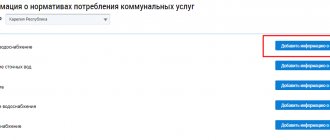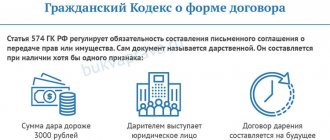published: 10/10/2016
The concept of a property trust management agreement is enshrined in Article 1012 of the Civil Code of the Russian Federation. Under a property trust management agreement, one party (the management founder) transfers property into trust management for a certain period of time to the other party (the trustee), and the other party undertakes to manage this property in the interests of the management founder or the person specified by him (the beneficiary).
The transfer of property into trust management does not entail the transfer of ownership of it to the trustee.
By virtue of clause 2 of Art. 1017 of the Civil Code of the Russian Federation An agreement for trust management of real estate must be concluded in the form provided for an agreement for the sale of real estate. The transfer of real estate into trust management is subject to state registration in the same manner as the transfer of ownership of this property.
Essential terms of the trust management agreement:
- composition of property transferred to trust management;
- the name of the legal entity or the name of the citizen in whose interests the property is managed (the founder of the management or the beneficiary);
- the amount and form of remuneration to the manager, if the payment of remuneration is provided for in the contract;
- contract time.
The absence of one or more of the above conditions makes the agreement not concluded, which does not give rise to any legal consequences for the parties to such an agreement.
You may be interested in: Contract development and review services.
Is it necessary to register a property trust agreement?
Trust management is a transaction in which one entity hands over to another any property item, and the counterparty, in turn, manages this item in the interests of the owner or another person - the beneficiary (Article 1012 of the Civil Code of the Russian Federation). In this case, the owner of the subject of the transaction remains the entity that transferred the thing into trust management.
The provisions on the form of the property trust agreement are established in Art. 1017 of the Civil Code of the Russian Federation. The general condition is the need for written documentation. However, if the subject of the transaction is real estate, then the agreement must be drawn up according to the rules for drawing up a real estate purchase agreement. Accordingly, the agreement must be written, and the transfer of rights under it should be recorded in the same form as in the case of registration of the transfer of the owner’s powers to such property. Thus, state registration of the transfer of real estate for management is required, but not the agreement itself.
It must be borne in mind that failure to comply with the provisions of the law on the rules for formalizing the transaction in question entails the invalidity of the agreement.
Risks when executing a trust management agreement
If the DDU contains essential conditions and the form is followed when concluding it, then risks associated with the liability of the trustee under Art. 1022 of the Civil Code of the Russian Federation.
The lack of due diligence of the trustee about the interests of the founder of the management or the beneficiary when managing property is the basis for bringing him to responsibility under clause 1 of Art. 1022 of the Civil Code of the Russian Federation.
In judicial practice today there is no consensus on what should be understood as due diligence. This uncertainty is caused by the fact that the legislation is limited to the general wording on the need to carry out management in the interests of the founder of the management or the beneficiary (clause 1 of Article 1012 of the Civil Code of the Russian Federation).
For example, there are precedents when a trustee was held liable for the acquisition of illiquid securities (Determination of the Supreme Arbitration Court of the Russian Federation dated July 29, 2010 No. VAS-9541/10 in case No. A40-92496/09-8-749, Resolution of the Federal Antimonopoly Service of the Moscow District dated May 5. 2014 N F05-2611/2014 in case N A40-100258/13-57-972).
You may be interested in: Representation in arbitration court.
Or, for example, the arbitration court recognized that the management company did not show due diligence when it did not sell the securities when their value decreased below the limit specified in the agreement, it is obliged to compensate the founder of the management for lost profits in the amount of the difference in the value of the securities at the time of transfer and at the time of sale (Resolution of the Federal Antimonopoly Service of the West Siberian District dated January 27, 2011 in case No. A67-3077/2010).
In this case, it is impossible to give any specific recommendation, since guilt is established by the court depending on the specific circumstances and the evidence presented. In general, it should be noted that the trustee must act reasonably, with due care and in good faith.
Also, trustees often exceed their powers, resulting in legal disputes. In particular, transactions concluded in case of exceeding the rights of the trustee may be declared invalid.
The procedure for forming a management agreement
The procedure for drawing up the contract in question includes several steps.
These include:
- registration of applications by interested citizens. Such functions are assigned to an employee of a notary office, legal successors, and representatives of government authorities;
- transfer of documentation to the notary office. This is a statement and confirmation that the estate has been opened;
- establishing the fact that the parties to the agreement have legal capacity;
- execution of the contract;
- signing the act.
Only written form of the document can be used.
Note! When the object is housing or an organization, it is required to go through the registration procedure with Rosreestr. Otherwise, the act is recognized as inconsistent with reality.
Sample agreement
It is necessary to provide an example of drawing up an act.
A sample agreement for trust management of inherited property looks like this:
Agreement on trust management of inherited property
Moscow city 01/23/2021
We, Ivanov Ivan Ivanovich, are a notary in Moscow, who received license No. 234652 dated September 17, 20017, referred to as the “Founder of the Management.” Petrov Per Petrovich born 08/21/1987, living at the address: Moscow, st. Sedova, 32-23 passport 5423 No. 124397, issued on May 12, 2008, called “Trustee”. Based on Art. 1173 of the Civil Code of the Russian Federation formalized the agreement:
1. Item
The founder transfers the property, and the manager undertakes to control the property of Ivan Sidorovich Sidorov, who died on January 21, 2021, living until the day of his death at the address: Moscow, st. Kirov, 42-98, included in the hereditary mass.
The guidelines are based on the purpose of protecting the property in question.
The legal successor specified in the will is the beneficiary - Ilya Alekseevich Smolin, born 05/23/1990.
2. Objects transferred by agreement
The composition of the inheritance mass transferred on the basis of the contract includes:
share in the authorized capital of Igra LLC, located at: Moscow, st. Sovetskaya, 1, OGRN 2636485746, TIN 87654321234, in the amount of 50%.
In relation to the specified object at the time of execution of the contract, the DDU is not in force.
3. Responsibilities and rights of the Trustee
Implement control functions over the received property.
Use measures aimed at preserving the property of the deceased.
Participate in meetings held by members of Igra LLC, having the authority to resolve issues classified as general.
The trustee is empowered to instruct another citizen to:
carry out activities aimed at monitoring objects, subject to the consent of the Founder of the management or if circumstances arise that affect the inability of the manager to independently implement such actions.
4. Payment for services
Services to managers are provided free of charge.
5. Responsibility of the parties
The trustee accepts responsibility for improper performance of duties.
If losses are caused to a citizen, they are subject to compensation by the Trustee.
6. Signatures of the parties
Founder of the department _____________________ (Ivanov I.I.)
Trustee _____________________ (Petrov P.P.)
Sample agreement for trust management of inherited property
Features of closed real estate mutual funds
A feature of a closed real estate mutual investment fund is the management of the property of the management founder together with the property of other management founders transferred to the mutual fund, as well as together with the property arising as a result of such management.
The founder of the trust management transfers real estate to the management company to include it in a mutual investment fund, subject to the condition of combining this property with the property of other founders of the trust management.
By virtue of clause 4 of Art. 1012 of the Civil Code of the Russian Federation, the features of trust management of mutual investment funds are established by law, in particular, by Federal Law of November 29, 2001 N 156-FZ “On Investment Funds”.
The property that makes up a real estate mutual investment fund is the common property of the owners of investment shares and belongs to them under the right of common shared ownership. The division of property constituting a mutual investment fund and the allocation of shares in kind from it are not permitted, except in cases provided for by this Federal Law.
The mutual fund trust management agreement is concluded by joining the standard mutual fund forms. It can be concluded by both an individual and a legal entity.
You may be interested in: Debt collection of legal entities.
Also, the features of mutual funds include:
- the term of the contract is up to 15 years;
- A mutual fund is not a legal entity.
- The contract term for a closed mutual fund cannot be less than 3 years.
- As a general rule, the management agreement is extended if there are no objections from the parties;
- Trust management of real estate is possible only in a closed mutual fund;
- Transferring pledged items to trust management of a mutual fund is not permitted.
- The Bank of Russia may establish by regulations the possibility of transferring one or another type of property into trust management.
- The funds intended for payment of shares are located in a special transit account, which cannot be foreclosed on.
What it is
In such relationships, the founder of real estate management transfers his property to another person, who will be called a trustee. The manager can use the received property for a certain period of time and under certain conditions, this is specified in the agreement between the parties.
ATTENTION! Management on a trust basis must necessarily be carried out in the interests of the real owner of the property.
According to Article 1014 of the Civil Code, a trustee can be either a commercial plan organization or an individual entrepreneur. The founder is considered to be the owner of the property. Real estate is not transferred into trust management to a state body or local government body.
You also need to pay attention to the fact that
the law prohibits the trustee from being a beneficiary. What property can be transferred to trust management?
These are enterprises, securities. This group also includes rights that are certified by uncertificated papers.
Property that is under economic management cannot be transferred to management. A trust agreement cannot be oral, only written. Otherwise, the oral agreement has no legal force and is considered invalid.
Additional risks of mutual funds also include:
- mistakes made when drawing up rules that will be difficult to change in the future;
- possible difficulties in state registration of rights to real estate, due to the non-prevalence of this type of activity;
- possible legal disputes arising as a result of the lack of uniform and extensive judicial practice related to mutual funds;
- participation of the Bank of Russia in monitoring the activities of mutual funds;
- participation in the management of closed-end mutual funds of the general meeting of owners of investment shares, including on issues of changing the amount of remuneration of the management company.
The rules of the management of closed mutual funds must contain the mandatory details established by clause 4 of Art. 17 Federal Law of November 29, 2001 N 156-FZ “On Investment Funds”. The standard rules approved by the Bank of Russia can be taken as a basis. The rules are subject to mandatory state registration by the Bank of Russia.




